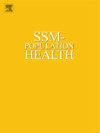中国成人子女教育对父母健康的代际传递:非线性及其机制
IF 3.1
2区 医学
Q1 PUBLIC, ENVIRONMENTAL & OCCUPATIONAL HEALTH
引用次数: 0
摘要
目前的研究表明,教育优势的代际传递在一生中是双向的。然而,因果分析研究的结果并不一致地支持成年子女教育对老年父母健康的有益影响。相互矛盾的证据表明一种复杂的关系,这种关系可能是非线性的,或者只在某些情况下突出,或者可以用特定的途径来解释,但仍未被探索。利用2016年和2018年中国家庭面板研究数据和工具变量估计,我们研究了成年子女教育对父母健康的影响,并系统地探讨了其异质性和潜在机制。本研究利用两阶段最小二乘(IV/2SLS)工具变量估计发现,成年子女教育显著改善了中老年父母的健康状况,但这种影响可能是非线性的。当成年子女的受教育程度超过中学教育水平时,健康的有益代际传递可能略有减弱。成年子女受教育程度对父母健康的影响在较不发达地区、较年轻的父母以及与成年子女同住或受教育程度低于成年子女的父母中可能更为显著。机制分析结果表明,成年子女教育可以通过压力基础途径(即家庭经济困难)和资源基础途径(即儿童的情感支持、父母的家务支持和改善父母对资源的获取)增强父母的健康,但不能通过所分析的健康习惯来增强父母的健康。我们的研究结果表明,促进儿童教育可能会改善父母在整个生命过程中的健康,尤其是至少中学毕业。我们的研究结果表明,在欠发达地区优先考虑基础教育政策,为经济压力提供缓冲或加强家庭内部的日常代际互动,对于发展中社会的健康老龄化至关重要。本文章由计算机程序翻译,如有差异,请以英文原文为准。
The intergenerational transmission from adult Children's education to parents' health in China: Nonlinearity and mechanisms
Current studies suggest the intergenerational transmission of educational advantages is bidirectional over the life course. However, results from causal analysis studies do not consistently support the beneficial effect of adult children's education on aging parents' health. The conflicting evidence indicates a complex relationship, which may be nonlinear or only prominent in certain settings or explained by specific pathways, but remains unexplored. Using the 2016 and 2018 China Family Panel Studies data and instrumental variable estimation, we examine the effect of adult children's education on parents' health and systematically explore its heterogeneity and underlying mechanisms. Our study finds that adult children's education significantly improves parents' health in middle and older ages using instrumental variables estimation with two-stage least squares (IV/2SLS), but the effect may be nonlinear. The beneficial intergenerational transfer of health may slightly weaken when adult children's educational attainment exceeds the middle school education level. The effect of adult children's education on parents' health may be more notable in less developed regions and among younger parents and parents living with or less educated than their adult children. The mechanism analyses results suggest that adult children's education may enhance parents' health through both stress-based pathways (i.e., family economic hardship) and resource-based pathways (i.e., emotional support from children, housework support from parents, and improving parents' access to the resources), but not via the analyzed health habits. Our findings suggest that promoting children's education may improve parents' health over the life course, especially at least graduating from middle school. Our findings imply that prioritizing basic education policy in less developed regions, and providing buffers for economic stressors or enhancing daily intergenerational interactions within families are important for healthy aging in developing societies.
求助全文
通过发布文献求助,成功后即可免费获取论文全文。
去求助
来源期刊

Ssm-Population Health
PUBLIC, ENVIRONMENTAL & OCCUPATIONAL HEALTH-
CiteScore
6.50
自引率
2.10%
发文量
298
审稿时长
101 days
期刊介绍:
SSM - Population Health. The new online only, open access, peer reviewed journal in all areas relating Social Science research to population health. SSM - Population Health shares the same Editors-in Chief and general approach to manuscripts as its sister journal, Social Science & Medicine. The journal takes a broad approach to the field especially welcoming interdisciplinary papers from across the Social Sciences and allied areas. SSM - Population Health offers an alternative outlet for work which might not be considered, or is classed as ''out of scope'' elsewhere, and prioritizes fast peer review and publication to the benefit of authors and readers. The journal welcomes all types of paper from traditional primary research articles, replication studies, short communications, methodological studies, instrument validation, opinion pieces, literature reviews, etc. SSM - Population Health also offers the opportunity to publish special issues or sections to reflect current interest and research in topical or developing areas. The journal fully supports authors wanting to present their research in an innovative fashion though the use of multimedia formats.
 求助内容:
求助内容: 应助结果提醒方式:
应助结果提醒方式:


